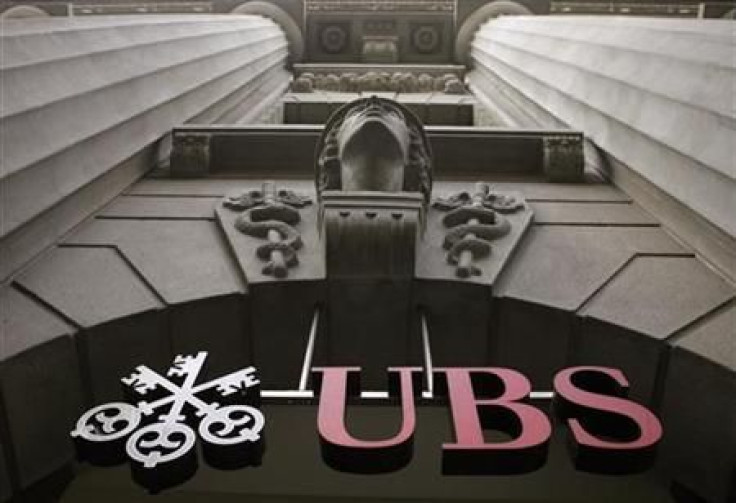UBS Salvages 3Q Profit with One-Off Gain

Swiss bank UBS AG overcame a 1.8 billion Swiss franc ($2 billion) rogue trading loss to post a smaller than forecast fall in third quarter net profit on Tuesday, salvaged by a one-off accounting gain.
Managing money for wealthy clients held up well, with strong inflows to the bank's Americas unit, despite tough economic conditions and the bad publicity of the unauthorized trading scandal, which came to light in September.
Although net profit for the third quarter fell by 39 percent to 1.018 billion francs at UBS, it beat average analyst forecasts for 276 million, after big one-off gains flagged earlier this month.
The figures are better than expected, even though they massaged them somewhat. But the result is still good. Wealth management is going very well and I think that will be the direction they want to push the bank in, said one trader.
UBS shares were up 2.3 percent at 11.41 francs at 1147 GMT, outpacing a 0.2 percent rise in the European banking index.
Interim Chief Executive Sergio Ermotti, appointed after Oswald Gruebel quit over the trading loss, described the quarter as very challenging for both the industry and the bank and said the fourth quarter had started with increased evidence of strain to the financial system.
In the absence of a resolution of the euro zone debt crisis and an improved U.S. economic outlook, current market conditions and trading activity are unlikely to improve materially, potentially creating headwinds for growth in revenues and net new money, the bank said.
INVESTMENT BANK RESTRUCTURING
Ermotti said he was finalizing plans to restructure the troubled UBS investment bank ahead of an investor day on November 17, but the broad strategy was already clear.
Our goal is to continue to be the preeminent wealth management franchise in the world together with a very strong presence in Switzerland, he told a call for analysts.
We want to have a strong, profitable, focused investment bank and asset management businesses to support this strategy.
Chief Financial Officer Tom Naratil said the bank would only give details next month of any possible new job cuts from the restructuring as well as details on when it plans to resume paying a dividend and how it will build its capital.
Naratil said an internal investigation into the trading scandal showed its controls had not been effective with shortcomings related to trading counterparties. He said the bank would take further disciplinary action if necessary.
Earlier this month, the bank accepted the resignation of the two co-heads of global equities, Francois Gouws and Yassine Bouhara, over the unauthorized trades.
Kweku Adoboli, who is accused of running up the trades, made no application for bail last week and will appear for a plea and case management hearing next month.
The bank, which already said the scandal had not resulted in many clients withdrawing their money in the quarter, reported wealth management net inflows of 7.8 billion francs, down from 8.2 billion in the previous three months.
That included a better-than-expected 4 billion francs of net inflows in its Americas wealth management business, while the European offshore business reported net outflows due to pressure on Switzerland's tax haven status.
Naratil declined to comment on client trends in the current quarter after the trading loss.
Wealth management has not blown out the light this quarter, said Kepler analyst Dirk Becker. We will see how the trading incident might have further affected the group's reputation only in the coming quarters.
ACCOUNTING GAIN
Rival Deutsche Bank also reported forecast-beating third-quarter profits on Tuesday, as retail banking and asset management offset a slump in investment banking, but similarly warned that the near-term outlook was highly dependent on the resolution of the euro zone debt crisis.
UBS said a 1.765 billion franc gain on the value of its own debt and 722 million from the sale of treasury-related investments helped make up for the trading loss and 387 million francs of restructuring costs it booked in the quarter.
This accounting gain -- which occurs because the bank could profit from buying back its own bonds at lower levels -- also gave a big boost this quarter to profits at most U.S. banks.
However, UBS results also mirrored their U.S. peers in showing declining bond and stock revenues as sovereign debt worries spiraled in the three months to September.
The investment bank posted a pre-tax loss of 650 million francs as it said revenues fell across all business areas due to the difficult market conditions and the strong Swiss franc.
Its foreign exchange business performed well, with revenues more than doubling on volatility and good client flows.
Vontobel analyst Teresa Nielsen said even though investment bank revenues were weak, the cost base was reduced more than expected. We see the Q3 results as being positive in a difficult quarter, she said.
Ermotti said a program announced in August to cut 3,500 jobs from the bank's some 66,000 staff was on track but said the bank would remain vigilant on costs, echoing similar comments from Deutsche Bank which on Tuesday said tough market conditions could lead to more job cuts.
The bank also confirmed the reliability of its financial statements in its 2010 annual report, despite the trading scandal.
($1 = 0.885 Swiss Francs)
(Additional reporting by Caroline Copley and Rupert Pretterklieber; Editing by Sophie Walker, Alexander Smith and Helen Massy-Beresford)
© Copyright Thomson Reuters 2024. All rights reserved.











